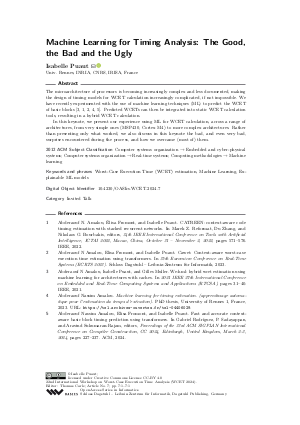Machine Learning for Timing Analysis: The Good, the Bad and the Ugly (Invited Talk)
Author
Isabelle Puaut 
-
Part of:
Volume:
22nd International Workshop on Worst-Case Execution Time Analysis (WCET 2024)
Part of: Series: Open Access Series in Informatics (OASIcs)
Part of: Conference: Workshop on Worst-Case Execution Time Analysis (WCET) - License:
 Creative Commons Attribution 4.0 International license
Creative Commons Attribution 4.0 International license
- Publication Date: 2024-07-26
File

PDF
OASIcs.WCET.2024.7.pdf
- Filesize: 309 kB
- 1 pages
Document Identifiers
Subject Classification
ACM Subject Classification
- Computer systems organization → Embedded and cyber-physical systems
- Computer systems organization → Real-time systems
- Computing methodologies → Machine learning
Keywords
- Worst-Case Execution Time (WCET) estimation
- Machine Learning
- Explainable ML models
Metrics
- Access Statistics
-
Total Accesses (updated on a weekly basis)
0PDF Downloads0Metadata Views
Abstract
The microarchitecture of processors is becoming increasingly complex and less documented, making the design of timing models for WCET calculation increasingly complicated, if not impossible. We have recently experimented with the use of machine learning techniques (ML) to predict the WCET of basic blocks [Amalou et al., 2021; Abderaouf N. Amalou et al., 2022; Amalou et al., 2023; Abderaouf Nassim Amalou, 2023; Abderaouf Nassim Amalou et al., 2024]. Predicted WCETs can then be integrated into static WCET calculation tools, resulting in a hybrid WCET calculation. In this keynote, we present our experience using ML for WCET calculation, across a range of architectures, from very simple ones (MSP430, Cortex M4) to more complex architectures. Rather than presenting only what worked, we also discuss in this keynote the bad, and even very bad, surprises encountered during the process, and how we overcame (most of) them.
Cite As Get BibTex
Isabelle Puaut. Machine Learning for Timing Analysis: The Good, the Bad and the Ugly (Invited Talk). In 22nd International Workshop on Worst-Case Execution Time Analysis (WCET 2024). Open Access Series in Informatics (OASIcs), Volume 121, p. 7:1, Schloss Dagstuhl – Leibniz-Zentrum für Informatik (2024)
https://doi.org/10.4230/OASIcs.WCET.2024.7
BibTex
@InProceedings{puaut:OASIcs.WCET.2024.7,
author = {Puaut, Isabelle},
title = {{Machine Learning for Timing Analysis: The Good, the Bad and the Ugly}},
booktitle = {22nd International Workshop on Worst-Case Execution Time Analysis (WCET 2024)},
pages = {7:1--7:1},
series = {Open Access Series in Informatics (OASIcs)},
ISBN = {978-3-95977-346-1},
ISSN = {2190-6807},
year = {2024},
volume = {121},
editor = {Carle, Thomas},
publisher = {Schloss Dagstuhl -- Leibniz-Zentrum f{\"u}r Informatik},
address = {Dagstuhl, Germany},
URL = {https://drops.dagstuhl.de/entities/document/10.4230/OASIcs.WCET.2024.7},
URN = {urn:nbn:de:0030-drops-204753},
doi = {10.4230/OASIcs.WCET.2024.7},
annote = {Keywords: Worst-Case Execution Time (WCET) estimation, Machine Learning, Explainable ML models}
}
Author Details
References
-
Abderaouf N. Amalou, Élisa Fromont, and Isabelle Puaut. CATREEN: context-aware code timing estimation with stacked recurrent networks. In Marek Z. Reformat, Du Zhang, and Nikolaos G. Bourbakis, editors, 34th IEEE International Conference on Tools with Artificial Intelligence, ICTAI 2022, Macao, China, October 31 - November 2, 2022, pages 571-576. IEEE, 2022.

-
Abderaouf N Amalou, Elisa Fromont, and Isabelle Puaut. Cawet: Context-aware worst-case execution time estimation using transformers. In 35th Euromicro Conference on Real-Time Systems (ECRTS 2023). Schloss Dagstuhl - Leibniz-Zentrum für Informatik, 2023.

-
Abderaouf N Amalou, Isabelle Puaut, and Gilles Muller. We-hml: hybrid wcet estimation using machine learning for architectures with caches. In 2021 IEEE 27th International Conference on Embedded and Real-Time Computing Systems and Applications (RTCSA), pages 31-40. IEEE, 2021.

- Abderaouf Nassim Amalou. Machine learning for timing estimation. (apprentissage automatique pour l'estimation du temps d'exécution). PhD thesis, University of Rennes 1, France, 2023. URL: https://tel.archives-ouvertes.fr/tel-04406029.
-
Abderaouf Nassim Amalou, Elisa Fromont, and Isabelle Puaut. Fast and accurate context-aware basic block timing prediction using transformers. In Gabriel Rodríguez, P. Sadayappan, and Aravind Sukumaran-Rajam, editors, Proceedings of the 33rd ACM SIGPLAN International Conference on Compiler Construction, CC 2024, Edinburgh, United Kingdom, March 2-3, 2024, pages 227-237. ACM, 2024.

